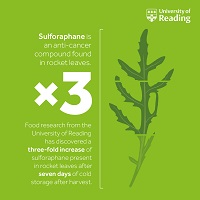Anti-cancer nutrients in rocket lift off during production process
Release Date 24 April 2017

Anti-cancer compounds in rocket salad leaves have been found to increase during postharvest shelf life, countering the idea that nutritional content decreases during commercial processing.
Food scientists from the University of Reading have discovered that compounds called isothiocyanates (ITCs) that have properties that fight forms of cancer, including prostate and gastrointestinal cancers, were significantly more abundant one week after processing in species of rocket (Eruca sativa).
In the study, the ITC sulforaphane increased by up to three times following commercial processing and seven days of shelf life.
Dr. Luke Bell, a food chemist from the University of Reading said:
“The discovery is really surprising, going against the assumption that nutrients found in rocket will dissipate over the period of time following harvest.
“Our study has shown that the processing actually has a potentially beneficial effect to consumers, and that rocket lovers can have confidence in the health boost a bag of rocket will give them. The biggest boost in these cancer-fighting compounds came seven days after processing, but begin to tail off after that.
Researchers at the University of Reading also conducted sensory analysis of rocket, to determine if the cancer fighting compounds were more or less prevalent depending on the flavour profile.
Dr. Bell continued:
“We found that there are some distinct varieties of rocket; some that are very hot, and some which are quite mild. The important thing is that the cancer-fighting compounds are prevalent in each variety, meaning that regardless of whether you like rocket mild or hot and peppery, you will still get the same potential health boost.”
“With regular consumption of rocket and sulforaphane, consumers could potentially improve their long-term health and reduce the risk of developing other chronic diseases, such as cardiovascular disease.”
The study was funded through a BBSRC iCASE award, and partly sponsored by Bakkavor, one of the UK’s leading fresh prepared foods supplier; and Elsoms Seeds Ltd. Elsoms providing the seeds for experiments and Bakkavor provided use of their facilities for growing field trials and processing the rocket leaves, and both companies provided a financial contribution.
Dr Lorraine Shaw, Agronomic Development Technologist from Bakkavor said:
“As a leading supplier of prepared salads we are keen to support research projects such as this. It helps us to further understand the role key ingredients can play in the healthy eating habits of consumers”.
Robin Wood, Managing Director of Elsoms Seeds, added “This has been a valuable study as part of our ongoing research and development focusing on the properties and flavours of herbs. We want to understand how we can improve the taste sensation of rocket for the benefit of the consumer so we were delighted to support the project which has given us valuable information for our rocket breeding programme.”
Full link to articles:
Changes in rocket salad phytochemicals within the commercial supply chain: Glucosinolates, isothiocyanates, amino acids and bacterial load increase significantly after processing
http://dx.doi.org/10.1016/j.foodchem.2016.11.154
Analysis of seven salad rocket (Eruca sativa) accessions: The relationships between sensory attributes and volatile and non-volatile compounds
http://dx.doi.org/10.1016/j.foodchem.2016.09.076
The influence of phytochemical composition and resulting sensory attributes on preference for salad rocket (Eruca sativa) accessions by consumers of varying TAS2R38 diplotype
http://dx.doi.org/10.1016/j.foodchem.2016.11.153
Bakkavor Group
2016 marked the 30th anniversary of Bakkavor. Bakkavor is a leading provider of fresh prepared foods, employing over 18,000 people globally and producing over 5,000 products in 18 different categories.
In the UK, it is the number one producer by value in 12 of the 16 categories of chilled food it supplies to the market. Products include ready meals, pizzas, salads, desserts, soups and sauces. Its customers include some of the UK’s best known grocery retailers including Tesco, Marks & Spencer, Sainsbury’s, Waitrose, Asda and the Co-op, who sell its products to consumers under their respective retailer brands.
Elsoms Seeds
Elsoms Seeds Ltd is the UK's leading independent plant breeding business with four key activities: vegetable seeds, agricultural seeds, seed treating and plant breeding/research and development. A culture of investment, passion, expertise and integrity has ensured the company continues to adapt to and fulfil the changing demands of its customers, suppliers and partners. Throughout the long history of the company the professionalism and teamwork within the organisation has ensured that Elsoms always provides excellent service.